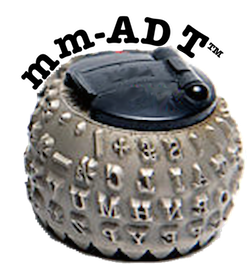There are two kinds of objects in mm-ADT: types and values.
-
1, 6, -5~> int values -
true false~> bool values -
'ab' 'mab'~> str values -
0.3 32.78~> real values -
['age':29]~> rec values -
[plus,2]~> inst values
-
int{1,4}~> one to four int values -
int{4}~> four int values -
int{0.37}~> a fuzzy int value -
int{u_matrix}~> an integer in quantum superposition
Quantifiers can come from any ordered ring with unity (see SRT: https://zenodo.org/record/2565243).
Interestingly, mm-ADT instructions form a ring with unity (* is function composition and + is branching).
-
int[is,[gt,5]]~> a single int value greater than 5 -
int[is>5]~> sugar syntax for the previous -
int[is>5&<10]~> a single int value between 5 and 10 -
int[choose[1,5,10]]~> a single int value drawn from the enumerated choices -
int[1|5|10]~> sugar syntax for the previous -
[1|5|10]~> sugar syntax for the previous
-
obj[choose,[int,bool,str]]~> an int or bool or str -
[int|bool|str]~> sugar syntax for the previous -
[int[is>2]|true|str{?}]~> an int greater than 2 or the true bool value or a str or nothing.
-
int{0,1}~> 0 or 1 int (Option) -
int{?}~> syntax sugar for the previous -
int{0,0}~> 0 ints (None) -
int{0}~> syntax sugar for the previous -
int{1}~> 1 int (Some) -
int~> syntax sugar for the previous
The sugars on quantifiers are: ? (zero or one), + (one or more), * (zero or more).
int => int[is,[gt,4]] // embed the LHS obj into the RHS type
int{?}<=int[is,[gt,4]] // the previous yields a int{?} range compilation (optional: some or none)
int<=int[is,[gt,4]] // force an int range (some) -- if range isn't met, failing type check-
int[plus,2]~> an int embedded in the same ordered interger space shifted by 2 -
bool⇐int[gt,3]~> a non-injective/surjective mapping from int to bool
[int[is>2]
|true
|str{?}[plus,'mm']] ~> a int greater than 2, or a true value, or maybe a string with mm appended to it.Processor[Obj,Type,Model]
Traverser[Obj,Type,Model,State]
-
A processor gets an input (stream) and embeds it into the provided type (query). The model is a read-only data structure specifying rewrites/schemas/global_values. A processor can be thought of as a "swarm" of traversers obeying the rules of the model.
-
A traverser references an obj and maintains a thread-local, read/write variable state accessed via [to] and [from] instructions.
I believe that a processor is just a traverser that controls an "internal swarm." Traversers/processes are computational context’s for the traversers/processes boxed within. Model and state should be one. And a model-state is read/write for the single traverser, but then read-only for the nested traverser swarm. Moving between swarms (model-ADTs) will be via [=rdf],[=neo4j],[=spark],[=kvstore], … This is what "freezes parental context" and spawns a new computational process. Communication between context’s is via
ATraverser[A[Obj],Model-State] <=[=adt]=> BTraverser[B[Obj],Model-State]